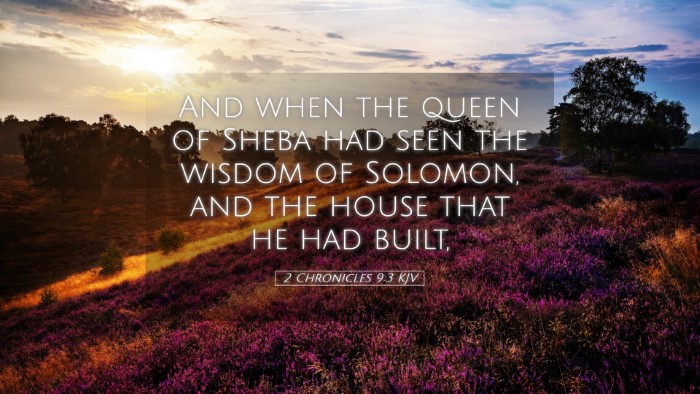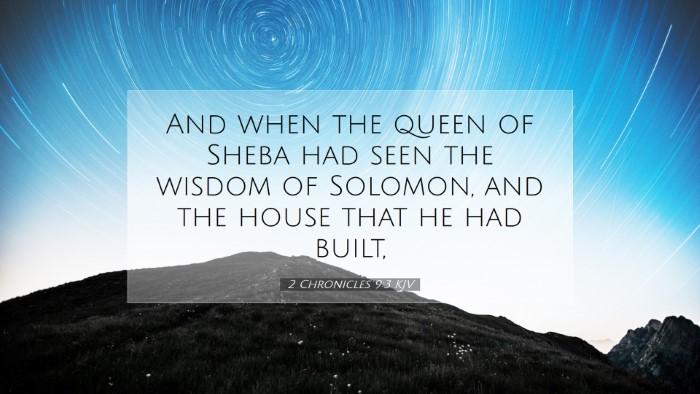2 Chronicles 9:3 Commentary
Verse: "And when the queen of Sheba heard of the fame of Solomon, she came to prove Solomon with hard questions at Jerusalem, with a very great company, and camels that bare spices, and gold in abundance, and precious stones: and when she was come to Solomon, she communed with him of all that was in her heart."
Introduction
This verse serves as a pivotal point in the narrative of Solomon's reign, reflecting themes of wisdom, wealth, and the recognition of God's blessing upon His chosen king. The visit from the queen of Sheba illustrates the international regard for Solomon’s wisdom and the extent of his influence, inviting deeper reflection among scholars and theologians regarding the nature of inquiry and divine providence.
Wisdom and Inquiry
According to Matthew Henry, the queen's visit is emblematic of the quest for wisdom—one of Solomon's key attributes. She seeks answers to challenging questions, indicative of not just a curiosity but a respect for Solomon's reputation. Henry elucidates that this encounter underscores the importance of wisdom in leadership and governance, as it is through such inquiry that truths are revealed and guidance is received.
Albert Barnes expands on this idea by highlighting that the queen's hard questions not only challenge Solomon’s intellect but also serve to magnify the character and depth of his wisdom. He proposes that her inquiries were not merely academic; they were deeply personal, reflecting the queen's own searches for meaning and understanding in her life. Thus, her coming to Solomon illustrates a spiritual quest that transcends mere political alliance.
The Significance of the Queen of Sheba
Adam Clarke emphasizes the historical and cultural significance of the queen of Sheba. He notes that her identity and kingdom have been subject to various interpretations, yet what remains clear is her role as a seeker of truth and knowledge. The queen’s journey to Jerusalem can be seen not just as a political mission but as a spiritual pilgrimage—her treasure-laden caravan symbolizing the quest for ultimate wisdom.
Clarke draws connections to God's revelations, suggesting that her approach to Solomon can be understood as a parallel to the human relationship with the divine: the readiness to seek, ask, and ultimately receive truth. Her visit is a call for all to pursue wisdom from God, where the journey towards understanding is met with generous rewards.
Wealth and Provision
The lavish gifts that the queen brings—gold, spices, and precious stones—are illustrative of her kingdom's wealth and serve to acknowledge Solomon's own material prosperity. Matthew Henry interprets this as a divine endorsement of Solomon’s reign; the wealth he possesses is indeed a sign of God's blessing. The various treasures contrast—wealth gained through worldly means and that which is divinely bestowed, reinforcing the idea that while material offerings are valuable, the pursuit of wisdom surpasses them.
Divine Influence and Prophetic Fulfillment
In contemplating the broader narrative of 2 Chronicles, it is important to remember that Solomon’s wisdom is an attribute bestowed upon him by God. Albert Barnes points out that this visit fulfills the prophecies concerning the Gentiles coming to seek out the God of Israel. The submission of foreign dignitaries to Israel’s king exemplifies the fulfillment of God's covenant with His people and establishes a moral and spiritual authority rooted in divine wisdom.
Application for Today's Leaders and Believers
This verse prompts contemporary reflection for leaders, scholars, and believers. What can be gleaned from the dialogue between the queen of Sheba and Solomon? Adam Clarke stresses that wisdom should always be pursued, and engaging with others who seek truth can lead to profound insights. For pastors and spiritual leaders, this passage encourages humility and a willingness to learn from all who come seeking truth, regardless of their backgrounds.
- Seek Wisdom Actively: Just as the queen pursued Solomon for knowledge, modern believers are called to seek wisdom earnestly—both through prayer and the pursuit of understanding in biblical texts.
- Open Hearts: The willingness to communicate “what is in our hearts” creates a space for meaningful dialogue with God and others, reflecting the need for transparency in the Christian journey.
- Recognition of Divine Gifts: Material resources should be viewed as gifts from God, and leaders should inspire stewardship and gratitude among their communities rather than mere accumulation.
Conclusion
The interaction between the queen of Sheba and Solomon encapsulates a moment of divine wisdom manifested through human inquiry. As we reflect on the implications of 2 Chronicles 9:3, it serves as an encouragement to foster a spirit of inquiry, cultivate wisdom, and recognize the divine origins of our understanding and blessings. In a world filled with questions, may our search lead us ever closer to the heart of God.


